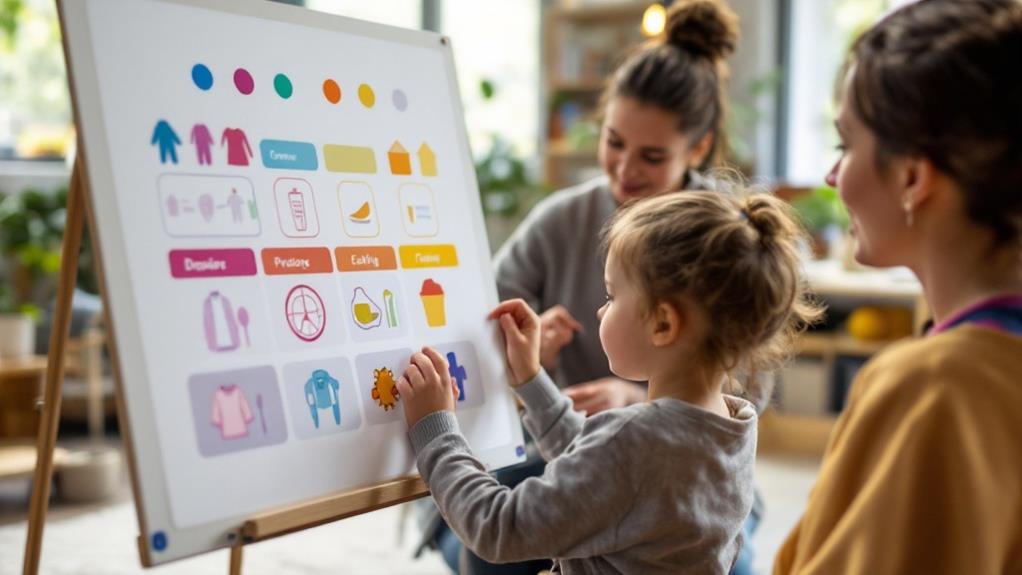ABA therapy is a powerful tool that helps you develop essential life skills like dressing, eating, and personal care. By breaking tasks into smaller, manageable steps, you'll find it easier to grasp each skill. Visual aids and positive reinforcement keep you motivated along the way. You'll practice dressing independently, learn proper utensil use, and establish effective hygiene routines. This structured approach not only builds confidence but also fosters autonomy, making daily tasks feel achievable. As you progress, you'll see the impact on your overall well-being, and there's so much more to discover about how these skills transform your life.
Key Takeaways on ABA Therapy for Life Skills Development
- ABA therapy breaks down tasks like dressing, eating, and personal care into manageable steps for easier learning and mastery.
- Visual aids and hands-on demonstrations enhance understanding and retention of functional life skills through structured guidance.
- Positive reinforcement encourages desired behaviors, fostering motivation and engagement in daily tasks.
- Individualized therapy plans address unique challenges, promoting independence and confidence in personal care routines.
- Ongoing assessments track progress and adjust strategies, ensuring effective skill development in dressing, eating, and personal care.
Overview of ABA Therapy

When it comes to understanding ABA therapy, you'll find it's all about using behavioral principles to foster meaningful change in individuals' lives. At its core, Applied Behavior Analysis (ABA) focuses on identifying specific behaviors and the factors that influence them. This approach helps you break down complex tasks into manageable steps, making it easier for individuals to learn and grow.
In practice, ABA therapy emphasizes the importance of reinforcement. You'll see how positive reinforcement encourages desired behaviors, while minimizing negative ones. As you work with clients, you'll notice that consistent, data-driven strategies can markedly enhance their learning experiences.
It's not just about correcting behaviors; it's about promoting independence and self-sufficiency. You'll also engage in ongoing assessments to track progress, ensuring that the strategies you implement are effective.
As you gain insights into each individual's unique needs, you can tailor interventions that resonate with them personally. Ultimately, ABA therapy empowers you to make a lasting impact, helping individuals navigate their daily lives more effectively.
Through patience and dedication, you'll witness the transformative power of ABA, enabling others to thrive in their environments.
Importance of Functional Life Skills
Functional life skills are essential for individuals to navigate daily challenges effectively and achieve greater independence. Mastering these skills can greatly enhance one's quality of life, allowing you to participate more fully in everyday activities. Imagine being able to dress yourself, prepare your meals, or maintain personal hygiene without assistance—these aren't just tasks; they're gateways to autonomy.
When individuals develop functional life skills, they gain confidence and self-esteem. You might notice how small victories, like managing your own meal prep, can lead to a sense of accomplishment and motivation. Additionally, these skills foster social interaction, as they enable individuals to engage more freely with peers and family members.
In a supportive environment, you can break down complex tasks into manageable steps, making learning effective and enjoyable. It's not just about teaching; it's about empowering individuals to take charge of their lives.
As you help others cultivate these skills, you're not just teaching them how to dress or eat; you're equipping them with the tools they need for a fulfilling life. Fostering functional life skills is a profound way to support growth and independence in those you serve.
Dressing Skills Development

Mastering dressing skills can really transform your daily routine and boost your confidence. When you help someone develop these essential skills through ABA therapy, you're not just teaching them how to put on clothes; you're empowering them to express their personality and independence.
In therapy, you can break down the dressing process into manageable steps, making it less overwhelming. Start with familiarizing them with different clothing items and their functions. Use visuals or hands-on demonstrations to show how to put on shirts, pants, and shoes. Consistent practice in a supportive environment reinforces these skills.
You'll notice that your efforts pay off as they begin to choose their outfits, zip zippers, or button shirts with more ease. Celebrating their successes, no matter how small, fosters a sense of accomplishment that further encourages their growth.
As they gain confidence in dressing themselves, you're not just helping them with a task; you're also nurturing their self-esteem and autonomy. This newfound independence can ripple into other areas of their life, making a significant difference in their overall well-being.
Your dedication to their development is truly invaluable.
Eating Skills Training
Building on the foundation of dressing skills, eating skills training is another essential area where ABA therapy can make a significant impact. You might be surprised to learn that mastering eating skills goes beyond just picking up a fork—it involves understanding routines, social cues, and even food preferences.
Through ABA therapy, you'll break down the eating process into manageable steps, making it easier for individuals to grasp each component. For instance, you'll focus on teaching how to hold utensils properly, chew food, and even recognize when they're full. Visual supports, like picture schedules, can be incredibly helpful in reinforcing these skills.
You'll also encourage independence by gradually prompting less, allowing individuals to take charge of their meals. Moreover, social eating situations can be addressed, helping individuals learn how to navigate mealtime with family or peers.
Personal Care Routines

Recognizing the importance of personal care routines can greatly enhance an individual's sense of independence and well-being. ABA therapy plays a significant role in helping individuals develop these routines, making everyday tasks more manageable and empowering.
By focusing on specific skills, you can foster confidence and self-sufficiency.
Here are four key personal care routines ABA therapy can support:
- Hygiene Practices: Learning how to brush teeth, wash hands, and shower consistently promotes health and self-esteem.
- Grooming Skills: Mastering hair care, nail trimming, and skincare routines encourages a sense of pride in one's appearance.
- Dressing Techniques: Understanding how to choose appropriate clothing and put it on independently fosters decision-making and autonomy.
- Personal Organization: Developing systems for organizing personal items helps maintain a tidy environment and reduces stress.
Breaking Down Tasks
Breaking down tasks into smaller, manageable steps can make a world of difference in daily life. When you're helping someone learn essential skills like dressing, eating, or personal care, it's vital to simplify these tasks. Instead of overwhelming them with everything at once, focus on one small step at a time.
For instance, when teaching dressing, start with picking out clothes. Once that's mastered, move on to putting on a shirt. Each step builds confidence and competence.
You might find it helpful to create visual aids or checklists, which can serve as reminders of the steps involved. As you guide someone through these tasks, be patient and supportive. Encourage them to celebrate small victories, reinforcing their progress.
This approach not only makes learning more effective but also fosters independence.
Ultimately, breaking down tasks allows individuals to grasp the skills needed for daily life. It transforms seemingly intimidating activities into achievable goals, helping them gain confidence and autonomy.
When you take the time to simplify these tasks, you're not just teaching; you're empowering someone to thrive.
Role of Positive Reinforcement

Harnessing the power of positive reinforcement can greatly enhance the learning experience for individuals developing life skills. This effective strategy encourages desired behaviors by offering rewards or praise, making the learning process enjoyable and motivating.
When you apply positive reinforcement, consider these key approaches:
- Immediate Feedback: Provide praise right after the individual completes a task, like buttoning a shirt. This helps them make connections between their actions and the positive outcome.
- Variety of Rewards: Use different types of reinforcers—stickers, verbal praise, or extra playtime. This variety keeps motivation high and engages the individual in the learning process.
- Consistency: Be consistent in your reinforcement. If you reinforce a behavior today, do it tomorrow too. This consistency helps solidify the skill.
- Gradual Fading: As the individual becomes more skilled, gradually reduce the frequency of reinforcement. This encourages independence while still offering support.
Individualized Therapy Plans
Creating individualized therapy plans is essential for effectively addressing the unique needs of each person developing life skills. You'll want to take the time to understand the specific challenges and strengths of the individual you're working with.
Every person has different experiences, preferences, and learning styles, so a one-size-fits-all approach simply won't cut it.
In these personalized plans, you can incorporate targeted strategies to tackle daily tasks like dressing, eating, and personal care. For example, if someone struggles with dressing, you might break down the steps into smaller, manageable parts and use visual aids or modeling techniques.
By focusing on what works best for them, you'll help them build confidence and independence.
Involving the individual in the planning process is key. By gathering their input and preferences, you create a sense of ownership, making them more engaged in their own learning.
This collaboration enhances motivation and encourages progress, ensuring that the therapy becomes a meaningful part of their daily routine.
With an individualized approach, you can pave the way for lasting life skills that truly fit the person's unique journey.
Progress Tracking and Assessment

Tracking progress and evaluating outcomes are essential components of ABA therapy for life skills. You need to guarantee that the strategies you implement are effective and meaningful for those you serve. By consistently monitoring progress, you can make informed decisions about adjustments and next steps.
Here are four key elements to focus on:
- Data Collection: Regularly gather data on specific skills, noting successes and challenges. This helps you see patterns and identify areas needing more attention.
- Goal Setting: Establish clear, measurable goals that align with the individual's needs. These goals provide direction and motivation, making the learning process more engaging.
- Regular Reviews: Schedule periodic assessments to review the data collected. This allows you to celebrate achievements and reassess strategies as needed.
- Involvement of Stakeholders: Engage family members or caregivers in the assessment process. Their input can provide valuable insights and support the individual's progress outside therapy sessions.
Real-Life Success Stories
Many individuals have experienced remarkable transformations through ABA therapy, demonstrating its potential in developing essential life skills.
Take, for instance, a young boy named Ethan. Initially, he struggled with dressing himself, often feeling frustrated and overwhelmed. Through tailored ABA strategies, he learned step-by-step processes, turning dressing into a manageable routine. Now, Ethan confidently dresses independently, celebrating each small victory.
Similarly, consider Sarah, who faced challenges with mealtime. Mealtimes were a source of anxiety, often resulting in refusal to eat. With the support of her therapist, Sarah practiced simple eating skills, like using utensils and trying new foods, in a fun and engaging way. Today, she enjoys a variety of meals, and her family cherishes their relaxed dining experiences together.
These success stories highlight how ABA therapy equips individuals with practical skills for everyday life.
Conclusion
Incorporating ABA therapy into your routine can truly be a game changer for developing functional life skills. By focusing on tasks like dressing, eating, and personal care, you're not just teaching skills but also fostering independence. With tailored plans and positive reinforcement, you'll see real progress over time. Remember, every little step counts; it's all about building a foundation for success. So, take it one day at a time, and watch as your efforts pay off.

